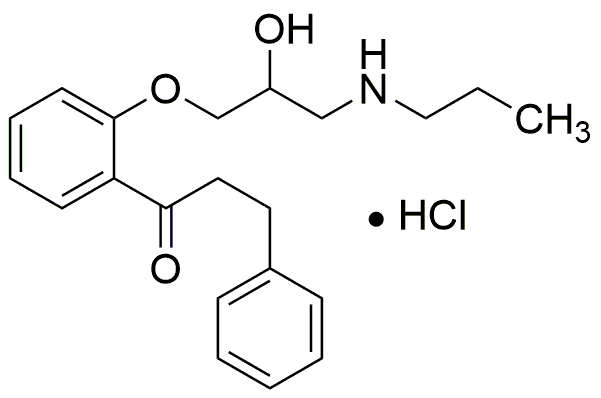Propafenone hydrochloride is widely utilized in research focused on
- Cardiology: This compound is primarily used as an antiarrhythmic medication to treat irregular heartbeats, providing significant benefits for patients with atrial fibrillation or ventricular tachycardia.
- Pharmaceutical Development: Researchers use propafenone hydrochloride in drug formulation studies to explore its efficacy and safety profiles, aiding in the development of new cardiovascular therapies.
- Clinical Trials: It plays a crucial role in clinical trials aimed at assessing the effectiveness of heart rhythm control medications, helping to establish guidelines for patient care.
- Drug Interaction Studies: The compound is essential in studying drug interactions, particularly with other cardiovascular drugs, to ensure safe and effective treatment regimens for patients.
- Research on Metabolism: Propafenone hydrochloride is used in pharmacokinetic studies to understand how the body metabolizes antiarrhythmic drugs, which can lead to improved dosing strategies and patient outcomes.
General Information
Properties
Safety and Regulations
Applications
Propafenone hydrochloride is widely utilized in research focused on
- Cardiology: This compound is primarily used as an antiarrhythmic medication to treat irregular heartbeats, providing significant benefits for patients with atrial fibrillation or ventricular tachycardia.
- Pharmaceutical Development: Researchers use propafenone hydrochloride in drug formulation studies to explore its efficacy and safety profiles, aiding in the development of new cardiovascular therapies.
- Clinical Trials: It plays a crucial role in clinical trials aimed at assessing the effectiveness of heart rhythm control medications, helping to establish guidelines for patient care.
- Drug Interaction Studies: The compound is essential in studying drug interactions, particularly with other cardiovascular drugs, to ensure safe and effective treatment regimens for patients.
- Research on Metabolism: Propafenone hydrochloride is used in pharmacokinetic studies to understand how the body metabolizes antiarrhythmic drugs, which can lead to improved dosing strategies and patient outcomes.
Documents
Safety Data Sheets (SDS)
The SDS provides comprehensive safety information on handling, storage, and disposal of the product.
Product Specification (PS)
The PS provides a comprehensive breakdown of the product’s properties, including chemical composition, physical state, purity, and storage requirements. It also details acceptable quality ranges and the product's intended applications.
Certificates of Analysis (COA)
Search for Certificates of Analysis (COA) by entering the products Lot Number. Lot and Batch Numbers can be found on a product’s label following the words ‘Lot’ or ‘Batch’.
Número de catálogo
Número de lote/lote
Certificates Of Origin (COO)
This COO confirms the country where the product was manufactured, and also details the materials and components used in it and whether it is derived from natural, synthetic, or other specific sources. This certificate may be required for customs, trade, and regulatory compliance.
Número de catálogo
Número de lote/lote
Safety Data Sheets (SDS)
The SDS provides comprehensive safety information on handling, storage, and disposal of the product.
DownloadProduct Specification (PS)
The PS provides a comprehensive breakdown of the product’s properties, including chemical composition, physical state, purity, and storage requirements. It also details acceptable quality ranges and the product's intended applications.
DownloadCertificates of Analysis (COA)
Search for Certificates of Analysis (COA) by entering the products Lot Number. Lot and Batch Numbers can be found on a product’s label following the words ‘Lot’ or ‘Batch’.
Número de catálogo
Número de lote/lote
Certificates Of Origin (COO)
This COO confirms the country where the product was manufactured, and also details the materials and components used in it and whether it is derived from natural, synthetic, or other specific sources. This certificate may be required for customs, trade, and regulatory compliance.


